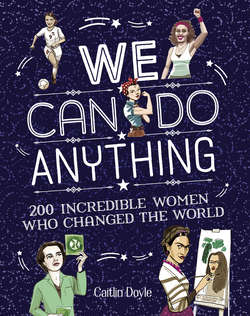Читать книгу We Can Do Anything: From sports to innovation, art to politics, meet over 200 women who got there first - Chuck Gonzales, Caitlin Doyle - Страница 26
ОглавлениеJOSEPHINE BAKER PIONEERING PERFORMER AND CIVIL RIGHTS ACTIVIST
FULL NAME: Freda Josephine McDonald Baker
BORN: JUNE 3, 1906, ST. LOUIS, MISSOURI, U.S.A.
DIED: APRIL 12, 1975, PARIS, FRANCE
NATIONALITY: AMERICAN/FRENCH
HURRICANE JOSEPHINE
The world may not have been ready for Josephine Baker, but from the start she was ready to take on the world. Her impact was huge, from dance, music, and film to civil rights and war resistance. Josephine was the first black woman to become a world-famous entertainer, as well as an international entertainment and political icon.
Freda Josephine McDonald was born in St. Louis, Missouri, to a washerwoman and a drummer. The family was poor, and Josephine grew up cleaning houses, babysitting, and waitressing to make ends meet. At the age of 15, she joined a variety show and soon moved to New York City. It was the early days of the Harlem Renaissance, an incredible artistic and social explosion of African-American arts in 1920s New York. Josephine was in the right place at the right time, and she quickly joined Broadway revues. However, she was rejected for larger roles for being “too skinny and too dark.” Undeterred, Josephine worked backstage and learned the routines. When a dancer left, Josephine was cast as the chorus line’s “last dancer,” a comic role in which the dancer “forgets” the routine before performing it perfectly at the end. With her impeccable comic timing, dancing talent, and stylish flair, Josephine was a hit.
A SUPER SPY IN A BANANA SKIRT
A move to Europe is really what allowed Josephine to shine. In Paris she became an overnight sensation for her now-famous Danse Sauvage. Wearing a feather skirt for that performance and an all-banana one for the next, Josephine performed with confidence and style, displaying movements that had never been seen before. Her career blossomed. She became one of the most photographed women in the world, and by 1927 she was the highest-paid entertainer in Europe. In the late 1930s, she starred in a number of movies and became the first black woman to star in a major film.
European success was incredible—but 1930s America was not ready for a black female celebrity with talent, success, and confidence. A brief 1936 U.S. tour was disastrous; the press called her terrible names. She quickly returned to Europe, just in the nick of time to make another massive contribution. World War II was starting, and Josephine supported France’s war effort in many ways. She raised morale by performing for troops, as well as smuggling secret messages on song sheets and acting as sub-lieutenant in the women’s air force. For her courage and contribution, Josephine was awarded the Medal of Resistance and named a Chevalier of the Legion of Honor—very high praise from the French government.
MAKING THE WORLD A BETTER PLACE
A political icon, Josephine returned to the U.S.A. in the 1950s and 1960s to support the Civil Rights Movement. While Europe was more cosmopolitan, racism was still rampant in mid-century America. Josephine toured the country, writing articles and performing. She refused to perform for segregated audiences, and this helped integrate many venues across the country. The National Association for the Advancement of Colored People (NAACP) declared May 20 “Josephine Baker Day” for her contributions. In 1963, Josephine spoke beside Dr. Martin Luther King, Jr., at the March on Washington for Jobs and Freedom, one of the largest political rallies in U.S. history. After Dr. King’s death, she was even asked to take over his leadership. Josephine adopted 12 children from around the world, creating what she called the “Rainbow Tribe,” showing that children of different religions and ethnicities could be brothers and sisters.
In 1973, Josephine agreed to perform at New York’s prestigious Carnegie Hall. She received a standing ovation before the show even started—she had finally got her great American showbiz success. In 1975, the 68-year-old Josephine performed her last show, a medley of her hits, and received some of the best reviews of her career. Sadly, she died a few days later. More than 20,000 people attended her funeral procession on the streets of Paris. She was given a 21-gun salute by the French military in recognition of her incredible contribution to French life.
| FABULOUS FIRSTS | |
| FIRST BLACK WOMAN TO BECOME AN INTERNATIONALLY FAMOUS PERFORMER | |
| FIRST BLACK WOMAN TO STAR IN A MAJOR FILM | |
| Carnegie Hall, New York City |
